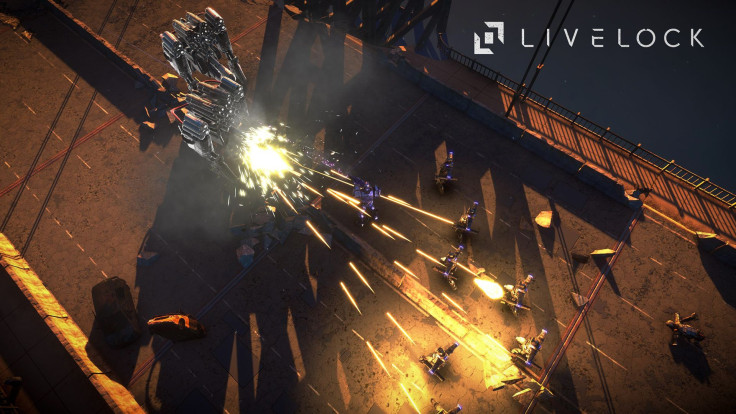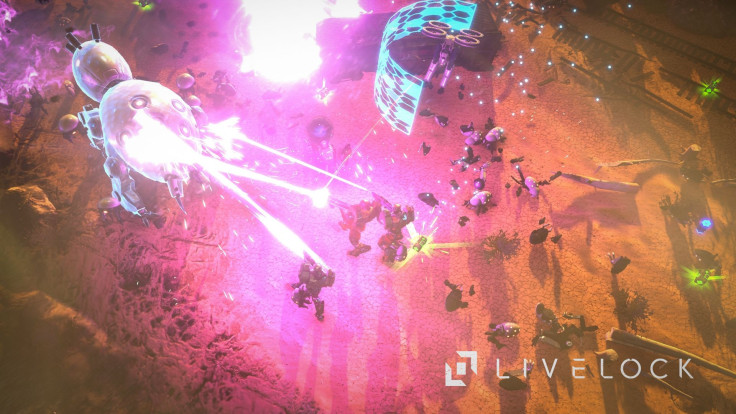The road to PAX South 2016 hasn’t been easy for Livelock, the recently announced project from Perfect World and Tuque Games. But the relatively small Canadian studio is pretty confident in the latest iteration of its post-apocalyptic shooter. And a few minutes of hands-on time with Livelock made it pretty easy to see why that’s the case.
Livelock is a top-down shooter set 150 years in the future, decades after a global cataclysm has wiped out all life on earth. Thankfully, the last humans on Earth created a contingency plan, uploading the digital recreations of humans’ brains to a database on an orbital satellite, SatCom. Now, the satellite is downloading that data into towering robots capable of great devastation. Only one character was featured in the build Tuque brought to PAX South but hearing Livelock lead game designer Kevin Neibert suggests each of the robotic warriors will be quite unique.
“[In the demo] you play as Hex, who’s one of these machines, but you have a human consciousness,” Neibert said. “You have your human memories, your personality [and] your emotions. But you’re in a gigantic killing machine.”
Think Nick Valentine, from Fallout 4, without the detective background and an apparent addiction to robo-steroids. Hex is an absolute monster on the battlefield; at least with the over-the-top loadout Tuque had me test during our demo. The robotic warrior’s primary weapon is your average assault rifle but his secondary weapons (and dash ability) are what make Hex such an interesting combatant. In addition to his primary weapon, Hex has a laser cannon that does increasingly large amounts of damage the longer you’re able to keep its beam focused on an enemy. Hex also carries a grenade launcher that can carpet the battlefield with explosives in seconds. Last, but certainly not least, the semi-artificial intelligence can call in a devastating orbital strike, which can be stacked by multiple players in co-op mode, when the action gets too hot.

Creative director and executive producer Jeff Hattem says Tuque plans to have three unique characters ready when Livelock heads to PC, PS4 and Xbox One later this year. Each war machine will have its own unique weapons and skills, giving players who prefer different play styles a few options when it comes time to begin each mission. Enemies will be similarly diverse, with two to four special moves each, and players will need to identify each enemy unit’s particular strengths and weaknesses to be successful in Livelock. But that can get difficult, considering the enemies change from one act to the next.
At launch, Tuque says Livelock will include a three-act campaign, each of which includes their own boss and mini-boss encounters. Skilled players will likely be able to complete the campaign in four to six hours; however, both Neibert and Hattem stressed it would likely take some time before most of the community reaches that skill level. Fortunately, if you’re one of the players who breezes through the Livelock campaign, Tuque Games is also creating a procedurally-generated scenario mode intended to extend the game’s life and challenge Livelock’s best players.
The Open Protocol mode will include a handful of scenarios at launch, with randomly chosen objectives like assassinate a particular target or recover a specific item, but the action will unfold on procedurally generated maps with ever-changing enemy distribution. Points rewarded at the end of each level, both in the campaign and Open Protocol mode, to encourage competition among players while out in the battlefield. Those points are also converted to experience points after the mission is over.
Interestingly, Tuque says they don’t currently have any plans for Livelock DLC. Both Neibert and Hattem said they wanted to ship a finished product, not a game that needs additional content to be considered a complete release. Rather than focus on what might come next, the studio is focused on delivering the best possible version of its vision for Livelock. But the team believes Livelock is the kind of game that fans (and the studio) will be able to stick with for years to come.
“I want to make stuff for this game for like 10 years. I love the world, the setting and the characters we’re creating,” Hattem said. “But, right now, there are no plans for DLC after the game.”
Instead, Tuque remains committed to ensuring each of the game’s three characters look, sound and play as differently as possible. Obviously, skills will complement one another, to encourage the teamwork that will be vital to succeeding in co-op games. But Tuque also wants to make sure they’re not creating artificial barriers between experienced players and the friends they recruit to the game. As a result, character progression is a bit flatter than fans expect from this style of shooter.

All players begin the game at level zero, working their way up to the cap (30) by completing campaign missions and, once the story is finished, spending some time in Open Protocol mode. But each new level doesn’t make your character more powerful in the traditional ways we’ve come to expect. Instead, players will unlock new skills and weaponry, each of which will emphasize a particular play style.
“Each weapon behaves totally different. Some have high rate of fire, low rate of fire, accuracy is really important,” Neibert told iDigitalTimes. “They each have their pros and cons. So it’s up to the player to learn that particular weapon and choose the appropriate weapons for the play-style they want to play.”
“The reason why we did that is because, from a design perspective, the game is way more fun when you play with your friends,” Hattem added. “Single-player is super fun, also. But when you’re playing with people, there are synergies there that are really cool.”
Hattem says around 20 people currently work for the studio, including veterans from EA Montreal, THQ and Ubisoft Montreal. But it’s taken a bit of time to reach that point. Livelock was originally announced as World War Machine, on IndieGoGo and the Collective, by a team of eight developers hoping to raise $50,000 to finish their game. Last year, Perfect World entered the picture, kicking off a hiring spree that grew Tuque Games to its current size.
The goal for Tuque is to make it easy for friends to play Livelock together, regardless of how experienced each party member is, without having to worry about power-leveling a particular player or organizing play sessions to keep everyone at roughly the same experience level. Players who’ve reached the cap will have a bigger toolset available to them. But those playing Livelock for the first time, who take time to learn the intricacies of the game, won’t just be the weak link in the chain.
“If you progressed and someone comes in at level one, they can still be effective right away” Hattem said. “So that’s why we’re focusing progression more on skill as opposed to being grindy.”
For a closer look at Livelock, take a couple of minutes to check out the game’s announcement trailer. Then head down to the comments section and let us know whether or not you’d be interested in playing the upcoming top-down shooter from Perfect World and Tuque Games.
Livelock is being developed for PlayStation 4, Xbox One and PC. The game is scheduled to debut sometime in 2016.
Be sure to check back with iDigitalTimes.com and follow Scott on Twitter for more PAX coverage.


















